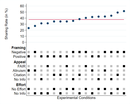META-REP Enhancing the Robustness of Observational Social Science Research by Computational Multi-Model Analyses
DFG Priority Program META-REP
Duration: 36 months, start in December 2021
Katrin Auspurg is co-applicant and part of the program committee of the priority program "META-REP (A Meta-scientific Programme to Analyse and Optimise Replicability in the Behavioural, Social, and Cognitive Sciences)" funded by the German Research Foundation (DFG).
A detailed project description can be found here and a video is also available.
Contact: Katrin Auspurg, katrin.auspurg@lmu.de
Subproject "Enhancing the Robustness of Observational Social Science Research by Computational Multi-Model Analyses"
- Duration: 36 months, start in April 2022
- Project lead: Prof. Dr. Katrin Auspurg, LMU Munich; Dr. Andreas Schneck, LMU Munich
- Predoctoral researchers: Laura Schächtele, LMU Munich; Daniel Krähmer, LMU Munich
- Funded by the DFG (Project No. 464507200)
Research goals and work program:
As part of the DFG Priority Program META-REP, Prof. Auspurg and Dr. Schneck have successfully secured DFG funding for a project on the robustness and sensitivity of results with non-experimental data in the social sciences.
The aim of this project is to develop diagnostic tools (especially based on computer-aided statistical analyses such as so-called "multiverse" or "multi-model" analyses) for the robustness of results to different model and sample specifications. In a second step, these tools will be used to take stock of the robustness and thus credibility of about 100 articles that are published in leading social science journals and/or based on data from the European Social Survey (ESS). Prior to this, the article’s computational reproducibility will be assessed using the authors’ original code. In addition, this inventory will be combined with initial analyses of risk and incentive structures for more or less credible research in the social sciences (based on theories from analytical sociology and quantitative science research). Another project goal is to develop evidence-based proposals for action tools to increase robust and credible results in the context of more transparent "open" science (including in the form of new publication formats).
Publication:
Krähmer, D., Schächtele, L., & Schneck, A., 2023: Care to share? Experimental evidence on code sharing behavior in the social sciences. PLOS ONE, 18(8): e0289380. https://doi.org/10.1371/journal.pone.0289380
Contact: Katrin Auspurg katrin.auspurg@lmu.de; Andreas Schneck andreas.schneck@lmu.de


